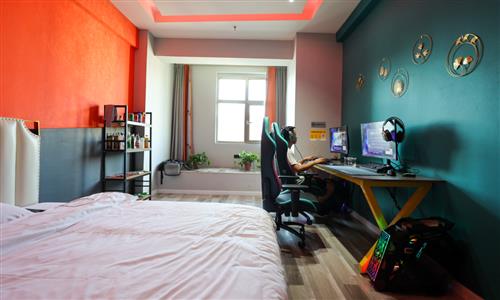Draft regulation on online gaming aims to promote industry’s healthy development, address gaming addiction among minors

An e-sports hotel gaming room in Baoji city in Northwest China's Shaanxi Province Photo: IC
The new draft regulation for the online gaming sector released on Friday aims to promote the industry's healthy development, a statement from the National Press and Publication Administration (NPPA) said on Saturday, after the draft gaming rules caused heated discussion in China.
The NPPA has heard the "concerns and opinions raised by all parties" and the administration "will study them carefully and further revise and improve" the draft rules, the statement read.
Industry insiders said on Sunday that the draft measures are a follow-up to previously implemented regulations intended to target online gaming addiction among minors. They will also bolster the gaming industry's sustainable development with optimized regulatory means following the NPPA's timely response to public concerns.
The official said that the draft rules aim to clarify issues concerning access for the involved operators, proposing encouraging measures that include provisions to protect the rights of minors and other consumers, according to the NPPA statement.
The NPPA, when drafting the regulation, listened broadly to opinions from relevant departments, industry associations and business leaders, the statement said. The NPPA will carefully study the concerns and feedback about the specific measures in the draft from all involved parties and continue to revise and improve the measures.
The draft should not be reviewed as a single regulation alone, as it actually complies with the previously established measures to further complete the nation's supervisory system related to online gaming, Liu Dingding, a veteran internet industry observer, told the Global Times on Sunday.
Multiple aspects of the gaming industry will be covered by the new rules, including the one-year limit for games going online after operating licenses are granted, spending restrictions and prohibitions against forced battles in games, a Guangzhou-based business insider surnamed Huang told the Global Times on Sunday.
Huang said that the new measures may change the operating pace and development logic of game production.
The NPPA released the draft on Friday with a broad range of rules aimed at curbing online spending on gaming, but it dealt a heavy blow to listed gaming companies such as NetEase and Tencent, with Hong Kong-listed gaming stocks including the two giants nosediving as of Friday's closing.
NetEase Games said on Saturday that the draft targets management shortfalls and will not have an intrinsic impact on its business. The company said that the gaming sector has sustained its development momentum under the guidance of relevant authorities while achieving major progress in key areas of public interest, like protecting minors, domestic news site chengdu.cn reported.
The company said that it will provide feedback to the draft, and that the release of the new regulation will further protect the rights of minors and consumers, advance the progress of gaming enterprises and promote the sector's high-quality development.
Tencent said on Friday that the draft will not meaningfully change the key elements of games such as reasonable business operating models and the pace, and the authorities will support the industry, especially in encouraging high-quality original games, according to media reports.
In addition to the above-mentioned companies, various domestic players have responded to the draft regulation. Multiple companies said that they have been studying the draft and will actively provide feedback, while believing that the final version will propel the industry's healthy and high-quality development, Chinese media outlet Jiemian reported on Saturday.
The draft proposes that online games would be barred from giving players rewards if they log in every day, or if they spend on a game for the first time, or if they spend several times on a game consecutively. Game providers should set a limit on how much a user can spend, and should provide pop-up warnings to remind users about unhealthy levels of game spending.

